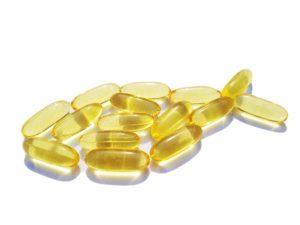Apigenin: A Flavonoid with Potential Health Benefits
Apigenin is a flavonoid that is found in numerous foods and herbs. Some of the richest sources include parsley, celery and chamomile (Hostetler 2013). Interest in the potential benefits of apigenin have been growing, since animal research indicates a number of possible uses.

Some of the potential health benefits of apigenin include:
- Providing antioxidant, anti-inflammatory and pain-reducing effects
- Preventing heart disease
- Supporting mental health
- Decreasing bone loss
Apigenin As an Antioxidant and Anti-inflammatory
Antioxidant Effects
Like other flavonoids, apigenin has significant antioxidant properties, allowing it to protect the body from free radical damage (Romanova 2001, Singh 2004). Initial studies suggest that the antioxidant effects may be relevant for preventing cancer and protecting from different types of toxic exposures (Wang 2014).
Anti-inflammatory Effects
The anti-inflammatory effects of apigenin might also be clinically relevant. In a rat model of polycystic ovarian syndrome, a common condition in women that causes excess testosterone, irregular periods, infertility and weight gain, apigenin had significant antioxidant and anti-inflammatory benefits (Darabi 2020). Oral administration reduced tumor necrosis factor alpha (TNF-alpha) and interleukin-6 (IL-6), two inflammatory signaling molecules that are often elevated in inflammatory conditions.
A separate rat study on inflammatory bowel disease also showed the promise of apigenin. In the study, apigenin was compared to steroids to address inflammation and damage of the intestinal tract (Sadraei 2017). After five days of treatment, the effects of apigenin were comparable to steroids.
Bleeding in the space around the brain can be caused by head trauma, often resulting in brain damage or death. Inflammation is well known to contribute significantly to the damage when a traumatic bleeding event occurs. In a study on its protective effects for the brain, rats were given a single injection of apigenin after a brain bleed had occurred (Zhang 2015). The single dose of apigenin significantly suppressed inflammation and swelling, helping to prevent early brain damage.
Apigenin and Pain
The anti-inflammatory effects of apigenin may be strong enough to treat pain conditions. In a study of rats with arthritis, oral apigenin was able to reduce inflammation, swelling and pain (Chang 2015). The authors concluded that apigenin might be a candidate treatment for joint pain and arthritis.
Apigenin and Heart Disease
Heart disease is the number one killer worldwide, taking almost 18 million lives per year (Mensah 2019). Finding safe, effective treatments to help reduce heart disease mortality is desperately needed to reduce these numbers.
While not proven, early research suggests that apigenin may play a potential role. In animal studies, apigenin has been shown to lower cholesterol and triglycerides, a type of fat in the blood that raises risks for heart disease (Zhang 2017). In addition, apigenin protects the lining of the blood vessels, helping to prevent atherosclerosis—the buildup of plaque in the arteries that can block blood flow to the heart and brain (Ren 2018).
Another major contributing factor to heart disease is elevated blood pressure. Interestingly, apigenin also seems to help address blood pressure problems. Studies in rats have found reduced blood pressure with apigenin treatment (Sui 2010). The mechanism may have some similarities with standard blood pressure medications that affect angiotensin converting enzymes (blood pressure medications called ACE inhibitors).
Apigenin and Mental Health
Beyond physical conditions, apigenin has also been studied for its mental health benefits. While the research is primarily in animals, the benefits still appear promising. In different mouse models of depression, apigenin was able to reverse depressive symptoms (Weng 2016, Li 2015).
Research suggests that the antidepressant effects of apigenin are related to a number of different mechanisms (Bijani 2022). First, apigenin helps normalize immune function and inflammation in the brain which can have negative effects on mood. Second, apigenin helps to restore energy production in brain cells, improving brain cell function.
For anxiety, apigenin has also been shown to be beneficial in animal models. In rats, apigenin was comparable to Valium for decreasing anxiety levels (Kumar 2014). The authors concluded that apigenin could be important for the treatment of anxiety and that it deserves additional research.
A separate study also found that apigenin reduced both depression and anxiety. Part of the effects appeared to be mediated through its impact on serotonin receptors (Amin 2022). Other data suggests that apigenin may reduce excitatory pathways in the brain, contributing to its anti-anxiety effects (Losi 2004).
Apigenin and Bone Health
Another potential benefit of apigenin is for the reduction of bone loss and helping to reverse osteoporosis. While the research is still early, it appears to show promise. In rats that had their ovaries removed, bone loss followed over the next seven weeks (Park 2008). Apigenin was administered orally three times per week over the next 15 weeks. Remineralization of the thigh bone occurred with apigenin supplementation. Surprisingly, apigenin also contributed to decreased food consumption and weight loss. A separate but similar study also found benefits for bone health, although with higher doses of apigenin (Lijin 2020).
As a potential treatment, apigenin has been shown to inhibit the formation of cells that break down bone or osteoclasts (Bandyopadhyay 2006). In addition, apigenin also causes mature osteoclasts to self-destruct in a process called apoptosis. Apigenin’s effects are due, at least in part, to blocking specific inflammatory signaling molecules that promote bone loss.
Supplementation

Apigenin is available as a supplement, but can also be consumed in common foods like parsley and celery along with chamomile tea. Unfortunately, the biggest problem for clinical use is its poor absorption. A study in humans consuming parsley only recovered 0.22% of the apigenin in subjects’ urine, and blood levels suggested poor absorption from the digestive tract (Meyer 2006). A separate study appears to confirm poor absorption from parsley in human subjects (Nielsen 1999). Even with poor absorption, apigenin does still appear to enhance an individual’s antioxidant status (Kashyap 2022).
While the research is early, combining apigenin with phospholipids, like lecithin, may help with absorption. Lecithin is a compound that has both fat and water soluble components, acting as an emulsifier and improving absorption of apigenin from the digestive tract (Telange 2017).
Conclusion
Apigenin is an interesting flavonoid that may hold potential for treating heart disease, inflammatory conditions, bone loss, depression and anxiety. Considering apigenin’s presence in common foods like parsley and celery, it is also easy to include in the diet. Hopefully, with more clinical research, we can better understand the full scope of its potential applications and utilization.



